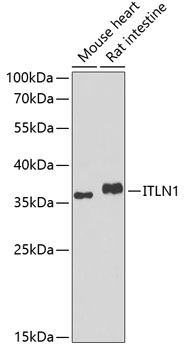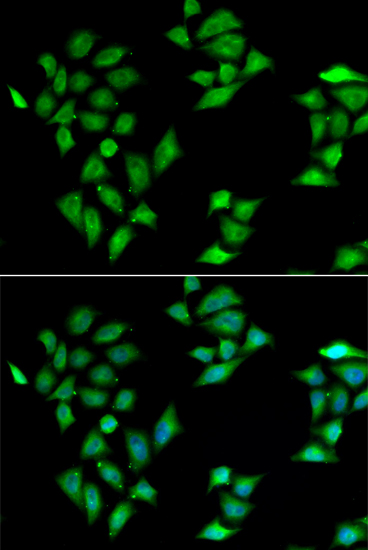-
Product Name
ITLN1 Polyclonal Antibody
- Documents
-
Description
Polyclonal antibody to ITLN1
-
Tested applications
WB, IF
-
Species reactivity
Human, Mouse, Rat
-
Alternative names
ITLN1 antibody; HL-1 antibody; HL1 antibody; INTL antibody; ITLN antibody; LFR antibody; hIntL antibody; omentin antibody; intelectin-1 antibody
-
Isotype
Rabbit IgG
-
Preparation
Antigen: Recombinant fusion protein containing a sequence corresponding to amino acids 19-313 of human ITLN1 (NP_060095.2).
-
Clonality
Polyclonal
-
Formulation
PBS with 0.02% sodium azide, 50% glycerol, pH7.3.
-
Storage instructions
Store at -20℃. Avoid freeze / thaw cycles.
-
Applications
WB 1:500 - 1:2000
IF 1:50 - 1:200 -
Validations

Western blot - ITLN1 Polyclonal Antibody
Western blot analysis of extracts of various cell lines, using ITLN1 antibody at 1:1000 dilution.Secondary antibody: HRP Goat Anti-Rabbit IgG (H+L) at 1:10000 dilution.Lysates/proteins: 25ug per lane.Blocking buffer: 3% nonfat dry milk in TBST.Detection: ECL Basic Kit .Exposure time: 90s.

Immunofluorescence - ITLN1 Polyclonal Antibody
Immunofluorescence analysis of HeLa cells using ITLN1 antibody . Blue: DAPI for nuclear staining.
-
Background
Lectin that specifically recognizes microbial carbohydrate chains in a calcium-dependent manner. Binds to microbial glycans that contain a terminal acyclic 1,2-diol moiety, including beta-linked D-galactofuranose (beta-Galf), D-phosphoglycerol-modified glycans, D-glycero-D-talo-oct-2-ulosonic acid (KO) and 3-deoxy-D-manno-oct-2-ulosonic acid (KDO). Binds to glycans from Gram-positive and Gram-negative bacteria, including K.pneumoniae, S.pneumoniae, Y.pestis, P.mirabilis and P.vulgaris. Does not bind human glycans. Probably plays a role in the defense system against microorganisms (Probable). May function as adipokine that has no effect on basal glucose uptake but enhances insulin-stimulated glucose uptake in adipocytes. Increases AKT phosphorylation in the absence and presence of insulin. May interact with lactoferrin/LTF and increase its uptake, and may thereby play a role in iron absorption.
Related Products / Services
Please note: All products are "FOR RESEARCH USE ONLY AND ARE NOT INTENDED FOR DIAGNOSTIC OR THERAPEUTIC USE"
